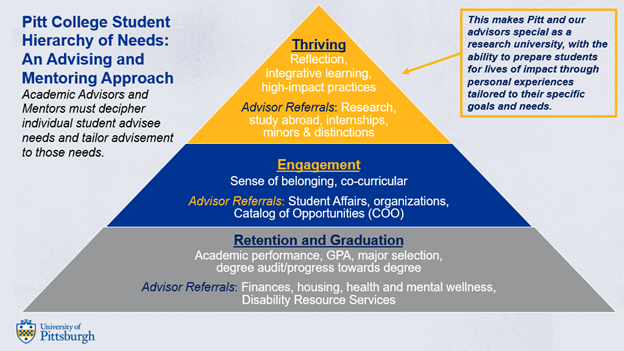The following framework identifies essential elements needed for a collaborative and holistic advising experience. It was created to provide:
- students with what they can expect of advising across the university while also honoring the autonomy and individuality of each advising unit.
- advisors and administrators with shared values, goals, and responsibilities to guide our practices and promote consistency for students and advisors.
University of Pittsburgh Advising Mission Statement
At the University of Pittsburgh, undergraduate advising, mentoring, and coaching are integral to the University’s educational mission as we provide a system of academic support to help students understand what’s Possible at Pitt! As such, we advocate collaborative and holistic advising interactions.
University of Pittsburgh Advising Model
As an institution, we champion the academic advising relationship by requiring that students meet with their advisor at least once per semester, but also encourage advisors and students to connect more often, as needed.
The University of Pittsburgh’s undergraduate academic advising structure, as defined by NACADA, the Global Community for Academic Advising, is a shared model. In this model, the Office of the Provost Student Success Team provides central administrative coordination and support, while students are advised in their respective academic units.
Pitt utilizes an “Academic Advising” hold on student accounts, which are automatically placed by the Office of the University Registrar each term and must be lifted by a student's academic advisor or departmental administrator before enrollment can take place.
Academic Advising Goals
Academic advisors, mentors, and coaches actively engage with students to support student success and institutional objectives while also recognizing and respecting individual differences, lived experiences and varied perspectives. Our goals are to:
- apply student development and engagement theory while working collaboratively with students to enrich their educational experience by informing them about university resources;
- co-create cohesive and comprehensive educational plans consistent with student interests, abilities, strengths, and goals as well as educating students to make connections across their curricular and co-curricular experiences;
- advocate rapport with students to enhance equity, inclusion and the exchange of diverse ideas;
- promote student understanding of institutional policies, procedures, and requirements as well as provide professional referrals when necessary.
No single academic advisor, mentor, or coach at the University of Pittsburgh has expertise in all areas. At a large research institution, we understand that students should be exposed to and consult with a system of academic support during their academic journey, who may be able to advise them on the many opportunities available at Pitt. Additionally, advisors should feel comfortable and confident making referrals across the campus community within this network.

An Advising and Mentoring Approach Using the Pitt College Student Hierarchy of Needs
Academic advisors and mentors must decipher individual student advisee needs and tailor advisement to those needs.
The pyramid reflecting this hierarchy of needs details:
Top section = Thriving
- Reflection, integrative learning, high impact practices
- Advisor referrals: Research, study abroad, internships, minors & distinctions
- Note: This makes Pitt and our advisors special as a research university, with the ability to prepare students for lives of impact through personal experiences tailored to their specific goals and needs.
Middle section = Engagement
- Sense of belonging, co-curricular opportunities
- Advisor referrals: Student Affairs Organizations, Catalog of Opportunities
Bottom section = Retention and Graduation
- Academic performance, GPA, major selection, degree audit/progress toward degree
- Advisor referrals: Finances, housing, health and mental wellness, Disability Resource Services
